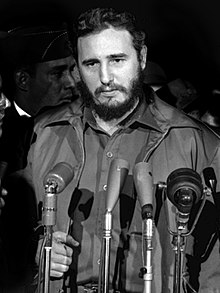Fidel Castro
| Fidel Castro | |
|---|---|

Castro visiting the United States in 1959
|
|
| 17th President of Cuba | |
|
In office December 2, 1976 – February 24, 2008 (on medical leave from July 31, 2006) |
|
| Prime Minister | Himself |
| Vice President | Raúl Castro |
| Preceded by | Osvaldo Dorticós Torrado |
| Succeeded by | Raúl Castro |
| First Secretary of the Central Committee of the Communist Party of Cuba | |
|
In office June 24, 1961 – April 19, 2011 |
|
| Deputy | Raúl Castro |
| Preceded by | Blas Roca Calderio |
| Succeeded by | Raúl Castro |
| President of the Council of Ministers of Cuba | |
|
In office December 2, 1976 – February 24, 2008 (Medical leave starting July 31, 2006) |
|
| President | Himself |
| Preceded by | Himself (as Prime Minister) |
| Succeeded by | Raúl Castro |
| 16th Prime Minister of Cuba | |
|
In office February 16, 1959 – December 2, 1976 |
|
| President |
Manuel Urrutia Lleó Osvaldo Dorticós Torrado |
| Preceded by | José Miró Cardona |
| Succeeded by | Himself (as President of Council of Ministers) |
| 7th & 23rd Secretary-General of the Non-Aligned Movement | |
|
In office September 16, 2006 – February 24, 2008 |
|
| Preceded by | Abdullah Ahmad Badawi |
| Succeeded by | Raúl Castro |
|
In office September 10, 1979 – March 6, 1983 |
|
| Preceded by | Junius Richard Jayawardene |
| Succeeded by | Neelam Sanjiva Reddy |
| Personal details | |
| Born |
Fidel Alejandro Castro Ruz August 13, 1926 Birán, Holguin Province, Cuba |
| Died | November 25, 2016 (aged 90) Havana, Cuba |
| Resting place | Santa Ifigenia Cemetery, Santiago de Cuba |
| Political party |
Orthodox Party (1946–52) 26th of July Movement (1953–65) Communist Party of Cuba (1965–2016) |
| Spouse(s) |
Mirta Diaz-Balart (1948–55) Dalia Soto del Valle (1980–2016; his death) |
| Relations | Raúl, Ramon, Juanita |
| Children | 11, including Alina Fernández |
| Residence | Santiago de Cuba |
| Alma mater | University of Havana |
| Profession | Lawyer |
| Signature |  |
|
|
Fidel Alejandro Castro Ruz (American Spanish: [fiˈðel aleˈhandɾo ˈkastɾo ˈrus] ![]() audio ; August 13, 1926 – November 25, 2016) was a Cuban revolutionary and politician who governed the Republic of Cuba as Prime Minister from 1959 to 1976 and then as President from 1976 to 2008. Politically a Marxist–Leninist and Cuban nationalist, he also served as the First Secretary of the Communist Party of Cuba from 1961 until 2011. Under his administration, Cuba became a one-party socialist state; industry and business were nationalized, and state socialist reforms were implemented throughout society.
audio ; August 13, 1926 – November 25, 2016) was a Cuban revolutionary and politician who governed the Republic of Cuba as Prime Minister from 1959 to 1976 and then as President from 1976 to 2008. Politically a Marxist–Leninist and Cuban nationalist, he also served as the First Secretary of the Communist Party of Cuba from 1961 until 2011. Under his administration, Cuba became a one-party socialist state; industry and business were nationalized, and state socialist reforms were implemented throughout society.
Born in Birán, Oriente as the son of a wealthy Spanish farmer, Castro adopted leftist anti-imperialist politics while studying law at the University of Havana. After participating in rebellions against right-wing governments in the Dominican Republic and Colombia, he planned the overthrow of Cuban President Fulgencio Batista, launching a failed attack on the Moncada Barracks in 1953. After a year's imprisonment, he traveled to Mexico where he formed a revolutionary group, the 26th of July Movement, with his brother Raúl Castro and Che Guevara. Returning to Cuba, Castro took a key role in the Cuban Revolution by leading the Movement in a guerrilla war against Batista's forces from the Sierra Maestra. After Batista's overthrow in 1959, Castro assumed military and political power as Cuba's Prime Minister. The United States came to oppose Castro's government, and unsuccessfully attempted to remove him by assassination, economic blockade, and counter-revolution, including the Bay of Pigs Invasion of 1961. Countering these threats, Castro formed an alliance with the Soviet Union and allowed the Soviets to place nuclear weapons in Cuba, sparking the Cuban Missile Crisis—a defining incident of the Cold War—in 1962.
...
Wikipedia
